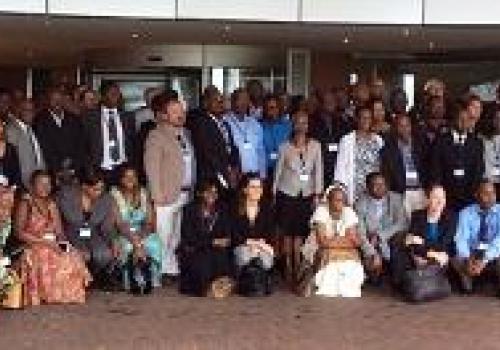The Southern African Development Community (SADC) secretariat convened a two-day multi-sectoral stakeholder consultative meeting from 25th to 26th February 2016 in Johannesburg, South Africa, to develop a regional preparedness and response strategy to address the impacts of El Niño on Agriculture and Food and Nutrition Security in Southern Africa.
The meeting was organised with support from the Food and Agriculture Organization of the United Nations (FAO) and United Nations World Food Programme (WFP). Senior officials from 13 of the 15 SADC Member States namely; Angola, Botswana, Lesotho, Madagascar, Malawi, Mauritius, Mozambique, Namibia, Seychelles, South Africa, Swaziland, Zambia, and Zimbabwe. Also in attendance were representatives from the humanitarian, development and donor communities, academia, NGOs, farmer unions, the private sector and the UN agencies.
In his keynote address SADC Deputy Executive Secretary for Regional Integration Dr. Thembinkosi Mhlongo said by working collectively and jointly with partners, SADC Member States and the Secretariat will minimize the adverse impact of the disaster on communities in the region.
“The region has faced drought emergencies of this magnitude in the past and it was only due to the concerted action by the Member States and the Secretariat, working jointly with partners gathered here, that disasters were averted”, Dr. Mhlongo added.
Speaking at the same meeting, the WFP Regional Director, Mr Chris Nikoi, said the challenges facing the region as a result of the impact of El Niño on livestock, food and nutrition security called for expanded partnerships involving SADC Secretariat, Member States, development partners, the UN agencies and the civil society organisations.
The FAO Sub-Regional Coordinator for Southern Africa Dr David Phiri also pledged his organisation’s commitment to support SADC Member States in their efforts to respond to the impact of El Niño.
The meeting noted that more than 28 million people in the region are affected by the poor rain season resulting from the 2015/2016 El Niño event, and that this figure is likely to increase.
To minimize the impacts of the 2015/2016 El Niño on the communities and ensure that development gains registered in the past are not reversed, the meeting agreed on the immediate implementation of short, medium and long-term measures to prepare, respond and build resilience to mitigate future disasters.
The meeting called for strengthened coordination among SADC Member States, SADC secretariat and other collaborating partners to reduce the impact of El Niño on lives and livelihoods of the affected population.

